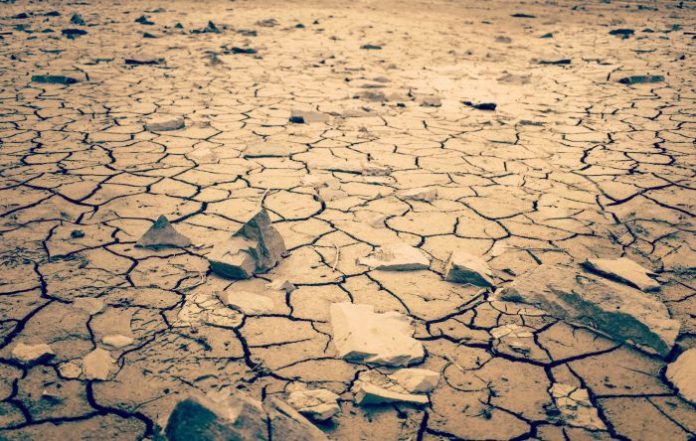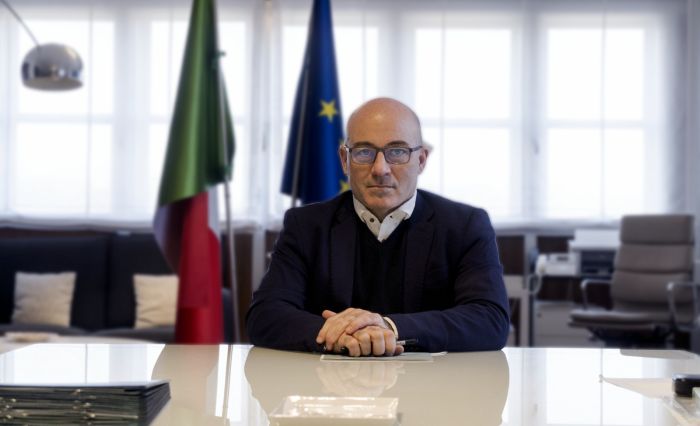
Italy aims to become a green pioneer in Europe and wants to invest 70 billion euros to achieve this goal. This is why Prime Minister Draghi has appointed the physicist Cingolani as super minister for the environment. How will he achieve this ambitious breakthrough?
When it comes to environmental issues, Italians are currently dealing with staggering figures. Just recently, Prime Minister Mario Draghi promised at the G7 summit to give $100 billion a year for climate protection in developing countries, together with the other G7 members. In Italy, 70 billion euros are to flow into a “green revolution”. Most of it will come from the Recovery Fund with which the EU wants to combat the consequences of the pandemic. Roberto Cingolani, as Minister for Ecological Transition, is responsible for this. He took office in February with the new Draghi government, after the previous coalition collapsed over the Recovery Fund debate.
SPIEGEL: Professor Cingolani, do physicists have a special talent for power? You remind me a bit of the first Angela Merkel: first a physicist, then environment minister…
Cingolani: “There are many physicists in politics. Perhaps when you have studied quantum mechanics, anything is possible. Even politics. However, Merkel wanted to govern. For me, however, I would never have imagined this path’.
SPIEGEL: So why did you do it?
Cingolani: “There are times for classical politics and there are times when technicians like me are needed. Italy is investing around 70 billion euro in the ecological transition. Now a profile like mine can be needed because there was a complex project to be written. When the organisation is in place, classical politics will have to take its place again”.
SPIEGEL: What do you intend to do with this amount of money?
Cingolani: “The targets for all of us in Europe are clear: 55% less CO2 emissions than in 1990 by 2030 and zero emissions by 2050. If I want to achieve this goal, I have to approach it as a scientific experiment”.
SPIEGEL: How dangerous is climate change for Italy?
Cingolani: “In our country there is a real threat of extreme weather events and desertification of large swathes of land. To put it bluntly, in the future we might have to spend the summer in Germany if it gets too hot in the Mediterranean. The Mediterranean … gets too hot. If we don’t put a stop to the rise in temperature now, today’s primary school children will experience dramatic consequences’.
SPIEGEL: Actually, the EU’s reconstruction fund is supposed to deal with the consequences of the pandemic crisis. What does the environment have to do with it?
Cingolani: “After the global financial crisis 15 years ago, huge sums were poured into growth and employment programmes. Choices that today we are forced to slow down for climate reasons. We simply can no longer afford to stimulate growth according to the old industrial and economic models, as we did during previous crises. This is not compatible with global warming”.
“We simply cannot afford today to stimulate growth according to the old industrial and economic models, as we did during previous crises. This is not compatible with global warming.”
SPIEGEL: But these correlations were already known at the time.
Cingolani: “In science, yes, but public awareness was lacking. And politicians don’t act unless it seems really urgent. It’s a problem of our economic system and the growth mechanism”.
SPIEGEL: Capitalism has to make a change, only renunciation can save the environment?
Cingolani: “When there are big global changes in nature, human beings don’t perceive it right away. We were the cause of these changes, not because we harmed the environment, but because we thought our growth model was a good thing. Now I think the time is more mature. The big companies are including sustainability in their balance sheets. If you produce and sell a lot but pollute the environment, it is no longer a worthwhile investment.
SPIEGEL: What needs to happen now? It’s not long before 2030.
Cingolani: ‘That’s why I developed a model with the rocket as a symbol. Think of it like this: we are on planet Earth. By 2030 we want to take this rocket to the Moon and by 2050 from there to Saturn. The Recovery plane is like the main engine that gives the initial acceleration to our rocket, which then detaches after take-off. The more correctly we set the initial trajectory, the safer it will be to reach the destination in 2050. Once the initial thrust is gone, the rocket can continue its journey with just the engine and a good pilot.”
SPIEGEL: The EU’s reconstruction plan…
Cingolani: “…is that initial acceleration. If we don’t provide enough speed now, the rocket doesn’t get out of the Earth’s gravitational field. That’s why, to go back to the initial question, a technician like me can be useful at this stage. We build the engine and set the trajectory so we don’t miss the target. The policy pilots can then control the rocket later without having to understand every detail of how the engine room works.”
SPIEGEL: What plans did you find when Mario Draghi formed his government of national unity on 15 February and appointed you minister for Ecological Transition?
Cingolani: “There was a large collection of proposals and ideas, but no vision. and from that we had to build a project, in eleven weeks, to present it in time to the European Commission”.
SPIEGEL: What are the most important objectives?
Cingolani: “We need two completely different strategies. Firstly, we need to mitigate the existing effects, for example by converting blast furnaces in steelworks, making them run on gas for the time being; this saves 30% of emissions compared to functional technologies. In Germany…”

SPIEGEL: …with its lignite and coal fields….
Cingolani: “…you have the same problem. We can’t close everything down, shut down our society and then starve to death. We still have to find the compromise between development, work and mitigation of problems”.
“Even if the government gives everyone an electric car, it won’t do much good until we have completely green electricity.”
SPIEGEL: What’s the second strategy?
Cingolani: “Prevention. While we reduce the damage caused by industry, we lay the foundations for an environmentally and economically more sustainable system. Take electric mobility, for example: even if the state gave each of us an electric car as a gift, it would be of little use until we had completely green electricity to power it. So we need to adapt the whole system, massively expand renewable energy, invest in smart grids and charging stations.
SPIEGEL: How do you plan to do that?
Cingolani: “Right now, like Germany, we generate about 30% of our electricity from renewable sources. If we want to get to 72% by 2030, we need to install 8 gigawatts of green energy capacity every year. The problem is that when I asked the power companies how much they install per year, the number 0.8 gigawatts came up.”
SPIEGEL: It won’t work at that rate.
Cingolani: “Exactly. We would need a hundred years instead of ten.”
“Before the ecological turnaround, there has to be a bureaucratic turnaround”.
SPIEGEL: What’s the reason?
Cingolani: “Bureaucracy. Italy is technically well positioned, we are world market leaders in these sectors. But in our country we don’t manage to make rapid progress. If I put 10 gigawatts of green energy generation out to tender, the tender should be awarded within a year and then the work could start. Instead, it takes six or seven years just for the permit. I have to increase green energy production tenfold, 8 gigawatts per year instead of 0.8 gigawatts per year, and I have to do it now, not when it will be. This can only be done if we achieve a bureaucratic breakthrough before the ecological one. That’s why we are now working on a simplification decree, which I call the ‘Acceleration Decree’, which will be discussed in Parliament in the coming weeks”.
SPIEGEL: Italian environmental associations have described your plans as “not green”. You are receiving criticism from many quarters.
Cingolani: “Some people want hydrogen instead of gas straight away, but our technology is simply not ready yet. Others are against offshore wind turbines because they don’t endanger migratory birds. I remember reading that even in your country, Germany, wind turbines were blocked because they endangered species of earthworms. The environmental movement rejects many things that do not correspond to their ideology.
SPIEGEL: The International Energy Agency, which has long relied on fossil fuels, has just done a U-turn and called for a halt to all investments in oil and gas, effective immediately. The green think tank finds it “shameful” that Italy continues to rely on gas.
Cingolani: “We should produce 72% of our electricity from renewable sources by 2030, until then I can’t give every citizen a bicycle with a dynamo to generate the rest of the electricity. The same people who are now making these contentions should give up their mobile phones and streaming services to save electricity. I would like to see more consistency in the debate. After all, we are talking about a green transition and we still need time before we can produce hydrogen in a CO2-neutral way.”
“I can’t give every citizen a bicycle with a dynamo to generate electricity.”
SPIEGEL: Italy and Germany decided long ago to phase out nuclear power. Now France is proposing new micro-reactors as a solution.
Cingolani: “The other day I spoke with the American climate envoy John Kerry here in my office. He said they are also studying it. And European Commission Vice-President Frans Timmermans told me that in addition to France, nine other member states, mainly from Eastern Europe, are already considering whether such micro-reactors could be defined as green energy.”
SPIEGEL: And what do you think?
Cingolani: “We are making huge efforts in Italy for ecological change. If such microreactors, as we know them from submarines, were to be considered green in the future, it would change the rules of the game”.
“We decided in a national referendum against large nuclear power plants, OK. But as a physicist, I want to understand what the new technologies could bring.”

SPIEGEL: Would a renaissance of nuclear power with microreactors be possible?
Cingolani: “Let’s see what happens in the EU. In any case, we have to deal with it. Incidentally, there are major European and American research programmes on nuclear fusion of hydrogen atoms. Unlike nuclear fission, this does not produce nuclear waste. It is the same principle as how the stars work, it is how the whole universe works. We should participate openly in these experiments. Maybe in 2070 we will be able to create a “star” enclosed in a machine designed for this purpose, generating clean energy for everyone. That would be the dream of mankind.
SPIEGEL: Some Italian newspapers are already calling you minister for nuclear transition, not ecological transition.
Cingolani: “I have also been accused of wanting to put small nuclear reactors in gardens and of accepting the birth of cats with three heads. I find it problematic when you cannot say a few words without being attacked. We decided against large nuclear power plants in national referendums and that’s fine. But as a physicist, I want to understand what new technologies might bring. Let’s keep studying – at most we’ll learn something.
SPIEGEL: There’s not much time for the transport revolution. How does Italy plan to ensure sustainable mobility?
Cingolani: “The first thing we need to do is invest in batteries in Europe. That’s why we need a gigafactory in Italy too. Then we need more recharging stations – at the moment we only have 10,000. In the meantime, we hope that the price of electric cars will come down. But that won’t do much good if people don’t change their behaviour.
SPIEGEL: What do you mean?
Cingolani: “If people continue to drive just to cover three kilometres, there’s nothing I can do about it. It has to start with the culture of young people in schools. And we need to modernise our public transport, for example by buying 5,500 new, cleaner buses and building 240 kilometres of new local transport routes in the big cities”.
SPIEGEL: According to Greenpeace, a fleet of more than 42,000 buses in local transport is too little. And the 240 new kilometres of track would barely be enough for Rome.
Cingolani: “But a start has been made. Moreover, the situation in Italy with its many historic centres, which are hamlets, is not easy. Metros are difficult to build when there are 3,000 years of history in the ground and buses don’t go through many narrow streets. Maybe we need electric mini-mobiles and other creative solutions.
SPIEGEL: Is solving Italy’s historical waste problem part of your green revolution?
Cingolani: ‘Some regions have perhaps the best waste management in Europe. Others don’t. I find it impossible that every day thousands of lorries transport waste from southern Italy all the way to Germany and to incineration plants. At the same time, people are fighting against waste incineration plants in their own country. I would like more intellectual honesty. Those who don’t want these plants should at least cooperate in the sorting plan.
SPIEGEL: Isn’t that happening?
Cingolani: “In some areas, we are still a long way from enforcing proper waste separation and collection, so people prefer to send all these lorries abroad. In comparison, incineration plants in Italy would really be more ecological”.
“Everyone likes ecological change. But when it becomes concrete, it can be traumatic”.
SPIEGEL: What is your assessment after three months in office?
Cingolani: “Everyone likes ecological change. But when it becomes concrete, it can also be traumatic”.
SPIEGEL: And how do you deal with life as a politician?
Cingolani: “After the change of government, we had very little time to write Italy’s plan for reconstruction. During the day we met with representatives from all the important sectors for ecological change, environmental associations, the car industry, the energy sector, agriculture. And at night we wrote. It was an emergency, for two months I only slept three hours a night. Of course, everything can be improved, but the result is a good plan.
SPIEGEL: Mario Draghi has claimed an international leadership role for Italy in environmental policy. Can he manage it?
Cingolani: “I have said from the beginning that we have to be ambitious here and work globally. We owe it to the European taxpayers who are financing the Recovery Fund. And there is no other way if we want to solve this historic task. The only thing I find disturbing is the disinformation movement, especially on social media, which is difficult to fight. What I fear most is the inability to tell the truth and that ideology often prevails.
SPIEGEL: Do you have a recipe for this?
Cingolani: “Most of these people still have a residue of honesty at the bottom of their soul. But they can no longer have real discussions. We have to talk to the younger generation, the 6-year-olds, the 12-year-olds, and explain to them rationally what awaits them when they have to make decisions in the future as parents or grandparents. That’s the biggest challenge.
SPIEGEL: Is a serious debate on the ecological turnaround no longer possible today?
Cingolani: ‘I always try to be transparent about our plans. But I’m considered boring. It’s easier to listen to guests on talk shows where there is no fact-checking. And where whoever produces the most decibels seems to be right. But this may only be a problem in Italy.”
“When my service is over, I’ll say hello.”
SPIEGEL: What happens after the recovery plan has started?
Cingolani: “It has to be pursued very seriously. The contract with Europe is very clear on the things that have to be done and must not be changed. However, at the moment we have a technical government. Afterwards the successors will have to take important decisions. But then I will no longer be there. When my service is over, I will say goodbye”.



































